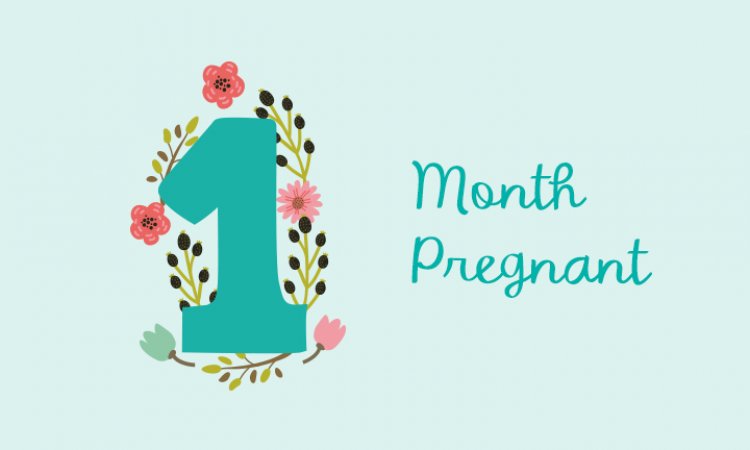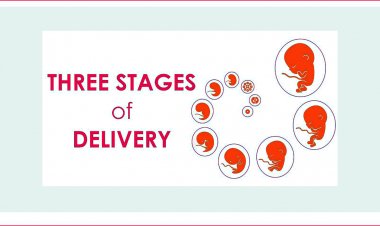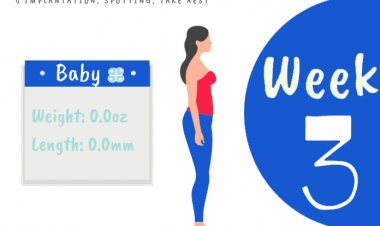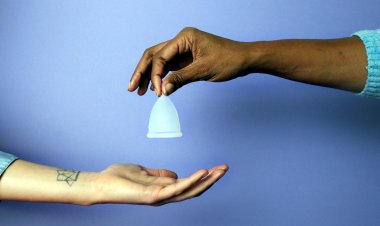First Month of Pregnancy – Symptoms, Baby Development and Physical Changes
The information about getting pregnant brings with it the possibility of many types of physical changes and problems. If all the necessary preparations are started from the first month of pregnancy, then all the problems related to pregnancy can be reduced to a great extent. Actually, in the first month of pregnancy, especially women who become mothers for the first time, there is a lack of information. Sometimes they are not even aware of their pregnancy. Therefore, in this article of MyBabyCare, we are going to elaborate on the information related to the first month (one to four weeks) of pregnancy.

First of all, we are telling what are the symptoms of being pregnant.
16 early signs of pregnancy Pregnancy Ke Lakshan
In the first month of pregnancy, many changes take place in the pregnant woman's body. Due to lack of correct information about these changes, many times pregnant women become a victim of nervousness or stress. However, if pregnant women notice the following symptoms in the first month of pregnancy, they should not panic at all:
1. Stop of menstruation: This is considered to be a sign of the beginning of pregnancy. Actually, as soon as a woman becomes pregnant, progesterone hormone starts to be made in her body. Menstruation stops because of this hormone.
2. Bleeding and cramping: When the egg is fertilized in the uterus, the pregnant woman may have light bleeding and feel body cramps. Both these symptoms can appear in the pregnant woman's body a week after conception.
3. Mood swings: In the first month of pregnancy, there are many fluctuations in the behavior of the pregnant woman. This fluctuation is due to the hormonal changes taking place in the pregnant woman's body. During this, the mood of the pregnant woman constantly changes, such that she may get irritated over anything or she may cry unnecessarily.
4. Stiffening of breasts: In the first month of pregnancy, the breasts of some pregnant women become tight and they also feel mild pain. During this, there may be slight swelling in the breasts of a pregnant woman. This is not possible to happen to everyone.
5. Change in nipple color: During this time you may also see a change in the nipple. Melanocytes (a type of skin cells) are affected due to changes in hormones. This leads to the production of melanin, which darkens the skin. This is the reason why the color of the nipple may appear darker.
6. Fatigue: In the first month of pregnancy, a pregnant woman may feel tired without doing anything. During this time he may also have trouble sleeping.
7. Frequent urination: Due to the increased level of progesterone hormone in the body, a pregnant woman may have problems with frequent urination in the first month of pregnancy.
8. Morning sickness: In the first month of pregnancy, a pregnant woman may experience nausea, vomiting and dizziness in the early morning. To deal with this, a pregnant woman can drink lemonade or take an energy drink like Vital Jade.
9. Changes in the taste and preferences of food: In the first month of pregnancy, a change in the taste and preferences of a pregnant woman can be seen. She may start eating something she didn't like before. During this, a pregnant woman may feel hungry again and again.
10. Heartburn: A pregnant woman may complain of a burning sensation in the chest, which is normal, so do not panic when it happens. However, if there is severe burning in the chest, a doctor should be contacted.
11. Constipation: Due to the increased level of progesterone hormone in the body of a pregnant woman, she may complain of constipation. Constipation is considered normal in the first month of pregnancy.
12. Increase in the ability to smell: Due to the hormonal changes in the body in the first month of pregnancy, the ability of a pregnant woman to smell increases (3).
13. Excessive hunger: In the first month of pregnancy, the appetite of the pregnant woman increases suddenly. She starts eating more food and feels hungry again and again.
14. Headache: Due to the hormonal changes in the body during the early days of pregnancy, a pregnant woman may complain of headache.
15. Pain in the lower abdomen: The embryo is implanted in the womb. Because of this, a pregnant woman may complain of pain in the lower abdomen.
16. Back pain: A pregnant woman may also have back pain. This is an early symptom of pregnancy, so do not panic with this pain.
Read the next part of the article to know how to confirm or confirm pregnancy.
pregnancy confirmation or pregnancy test
If a woman sees the above-mentioned symptoms in her body, then she should get a pregnancy test done as soon as possible. Pregnant women can do this test themselves or pregnancy can be confirmed by getting tested by a doctor. Below are some of the ways pregnant women can check or confirm their pregnancy:
- Testing with pregnancy kit: There are many types of pregnancy kits available in the market nowadays, with the help of which one can check the pregnancy on its own. To test for pregnancy with a pregnancy test kit, take the first morning urine sample in a small container and drop a few drops from the dropper provided with the test kit into the groove on the test strip. After that wait for 5 minutes. You will see one or two light or dark pink streaks. Read the instructions that came with the test kit carefully to understand what these colored streaks mean. On the basis of these instructions the result of the test can be ascertained.
- Urine or blood test confirmation: Urine or blood test can be done by the doctor to confirm the pregnancy. The results of this test are considered more accurate and reliable than the results from the pregnancy kit.
- Confirmation by ultrasound: If there is still doubt about pregnancy after both the methods mentioned above, then ultrasound technique should be resorted to. The result obtained from this technique is considered to be the most accurate.
body changes in first month of pregnancy
The following changes can be seen in the body of a pregnant woman in the first month of pregnancy:
- A pregnant woman may find her body more bloated than before and may feel a little tight in her back.
- The breast size of a pregnant woman may increase due to the increase in the level of estrogen in the body and increase in the mammary glands.
- Due to increased levels of progesterone and estrogen hormones in the body, the nipples of a pregnant woman may become darker and larger.
- A pregnant woman may have spotting up to a week or ten days after ovulation. This happens because of the implantation of the embryo in the womb.
- A pregnant woman may have more vaginal discharge.
Baby's growth and size in the first month of pregnancy
The process of development of the baby starts in the womb from the first month itself. The process is explained in detail below:
- Process of Fertilization: The union of sperms and ovules is called fertilization. The process of fertilization can begin two to three days after intercourse. In the initial phase of this process, a pair is formed by the union of sperms and eggs. This pair is called 'zygote' in English.
- Process of Implantation: The process of implantation begins after fertilization. In this process the zygote travels through the fallopian tubes to the uterus. Between the fourth and sixth day, this zygote divides into many cells. After this, these cells assemble and take the shape of a ball. This is called a 'blastocyst'. If this 'blastocyst' sticks to the wall of the uterus in two to three days, then the process of implantation is completed successfully.
- Embryo Development: The amniotic sac is formed when the fertilized egg develops. During this time the placenta also starts developing. Talking about the development of the baby, then during this time the face will start to form. Dark circles will appear instead of eyes. During this, the lower jaw and throat of the baby will start to form. At the same time, blood circulation will start by forming blood cells. By the end of the fourth week, your baby's heart will start beating 65 times a minute. By the end of this month, your baby will be inch, which is smaller than a grain of rice.
Diet for first month of pregnancy
At the beginning of pregnancy, a pregnant woman needs more nutrients. To meet this growing need, they should include the following in their diet:
What to eat in the first month of pregnancy?
- In the beginning, a pregnant woman should consume foods rich in folate, such as broccoli and oranges.
- Pregnant should start eating foods rich in Vitamin-B6, such as bananas, whole grains and dry fruits as soon as they conceive.
- Fiber rich fruits should be consumed in the beginning of pregnancy. During this, the pregnant should eat at least three types of fruits in a day.
- Consumption of milk products or only milk is also considered beneficial in the first month of pregnancy.
- If the pregnant is a non-vegetarian, then she should continue to consume meat. He is advised to eat properly cooked meat in addition to low-mercury seafood.
- Pregnant should include foods rich in iron, such as spinach and beetroot, in their diet at the beginning of pregnancy.
- At the onset of pregnancy, the pregnant body needs extra carbohydrates. For this, they should include sugary things in their diet.
What not to eat in the first month of pregnancy?
Eating certain things early in pregnancy can harm the pregnant woman and her fetus. Below we are listing some of the things that a pregnant woman should avoid:
- Seafood: Pregnant should have only low mercury seafood. High levels of mercury in food can cause harm to the fetus.
- Soft cheese: Pregnant women should avoid eating cheese made from pasteurized milk after conception. There is a risk of food poisoning due to harmful bacteria in such a thing.
- Packaged things: Pregnant should not consume packaged things. Also, things made in the microwave, such as cakes and biscuits, etc. should also be avoided.
- Raw Meat and Raw Eggs: Salmonella and Listeria bacteria are found in raw meat and raw eggs. These bacteria can have a bad effect on the fetus. Therefore, a pregnant woman should not consume raw meat or eggs.
- Raw papaya and pineapple: In the early days of pregnancy, eating raw papaya and pineapple should be avoided. These fruits can be eaten after delivery.
- Junk food and alcohol: Junk food, alcohol and tobacco should not be consumed during pregnancy. Apart from this, the pregnant should reduce the intake of caffeine-containing things, such as tea, coffee and chocolate.
Note: For her convenience, a pregnant woman should make a diet chart after consulting a doctor.
Exercise for first month of pregnancy
Exercising in the first month of pregnancy is beneficial. This brings agility in the pregnant body and gives her relief from stress during the early stages of pregnancy. The following exercises can be done in the first month of pregnancy:
- Walking (Aerobic): Doing aerobic exercise keeps the heart healthy and increases the chances of normal delivery.
- Swimming: Humans feel their weight in water ten times less than on land. Therefore, swimming is considered the easiest and most effective exercise for pregnant women. In early pregnancy, pregnant women are advised to go swimming for 15-20 minutes a day.
- Pilates Exercise: This exercise strengthens the abdomen, back and pelvis. Pregnant women can go to Pilates classes to learn this exercise.
- Stationary bike or spin classes: It can be good to ride a stationary bike in the first month of pregnancy. In addition, he is advised to join spin classes for 30 minutes three times a week.
- Yogasana: Pregnant should practice certain yoga asanas from the beginning of pregnancy after consulting with their yoga guru and doctor.
Note: Keep in mind that every pregnant woman's physical condition is different. Therefore, do not forget to consult a doctor before starting any exercise regimen.
What should be taken care of in the first month of pregnancy?
In the first month of pregnancy, pregnant women should take special care of the following things:
What to do in the first month of pregnancy?
(1) Do some exercise daily.
(2) Eat fiber rich food. Due to this, the pregnant woman does not have the problem of constipation and indigestion.
(3) Drink at least eight to ten glasses of water a day.
(4) Always think positive and try to be happy.
(5) Start taking the necessary vitamins and supplements after consulting a doctor.
(6) Make necessary improvements in your eating habits and make your diet chart after consulting a doctor.
(7) If possible, get such health insurance, which will provide the necessary tests, treatment and safe delivery during pregnancy.
(8) Keep in touch with people who have knowledge and experience related to pregnancy.
(9) Get maximum sleep and rest.
(10) Choose the right doctor for your regular check-up. For this, you can take help from those women who have already delivered.
(11)Start making financial plans for delivery as soon as pregnancy starts.
What not to do in the first month of pregnancy?
(1) Avoid taking long journeys. The risk of miscarriage is high in the first month of pregnancy, so long journeys should be avoided during this period.
(2) Do not wear high heeled sandals. Wearing such sandals during pregnancy can cause foot pain. This increases the risk of twisting and falling of the foot.
(3) Avoid bending over and don't lift heavy things. Doing so can put pressure on your tummy, which can hinder your baby's development.
(4) No medicine should be taken during pregnancy without consulting a doctor.
(5) Stay away from stress. To avoid this, read good books or listen to good music.
(6) Don't diet at all. During the first month of pregnancy, the pregnant woman's body needs more nutrients. In such a situation, dieting can harm the fetus.
(7) Do not take hot tub baths or sauna baths. The temperature during Sona Bath is between 70 °C to 100 °C (8). This temperature is not considered right for pregnancy.
Tips for the father of a future baby
When a woman conceives, the responsibility of the father of the child increases. Since, both the mother and father are equal partners in the happiness of having a child, so the responsibility of both is equal even during pregnancy. Below we are giving some such tips, which can help the father of the child to fulfill his share of responsibility in a better way:
- Do all the paperwork yourself: What health insurance to take for the mother of the child and how much it will cost, all such things should be taken care of by the child's father himself.
- Read about pregnancy: The father of the child should try to know as much as possible about pregnancy. This helps them understand the feelings and needs of the mother of the child.
- Exercise restraint: Due to hormonal changes in the first month of pregnancy, the nature of the pregnant woman keeps on fluctuating. In addition, she may also manifest a desire to eat frequently. In such a situation, the father of the child should act with restraint and should try to fulfill every small and big needs of the pregnant woman.
Frequently asked questions
1. Is it safe to have intercourse during the first month of pregnancy?
Yes, if you have never had a problem like miscarriage or premature delivery before, you can have intercourse during pregnancy. Still, do consult your doctor once about this.
2. What can mean bleeding in early pregnancy?
In the first month of pregnancy, bleeding can occur due to the implantation of the embryo in the womb. So, don't panic when this happens. Nevertheless, if bleeding occurs, your doctor should be informed.
3. Does the lower abdomen hurt in the first month of pregnancy?
Yes, lower abdominal pain can occur in the first month of pregnancy. This pain occurs due to the implantation of the embryo in the womb. Usually this pain goes away in one to two days.
The beginning of pregnancy is the first step towards bringing a new life into this world. These 9 months are special for both mother and baby. Therefore, a pregnant woman needs special care. In this article we have told about the first month. To know about the remaining months, you can read our other articles, which are written on the advice of experts.

 mybabycare
mybabycare 















